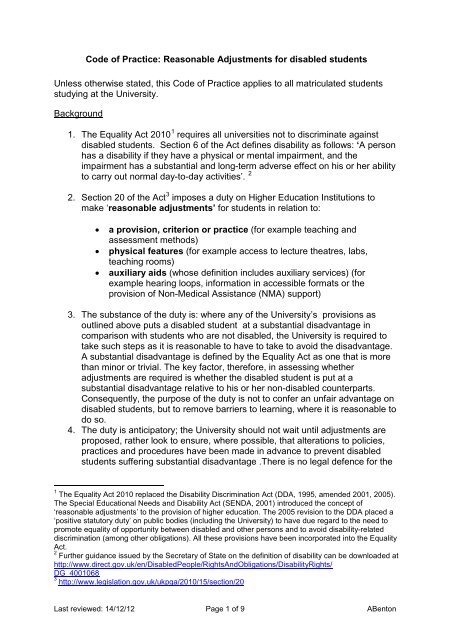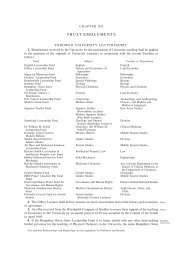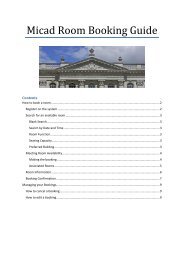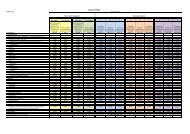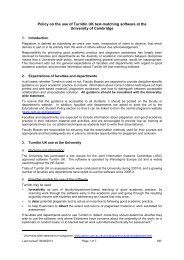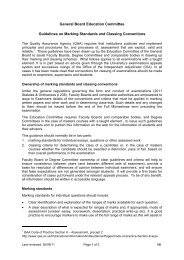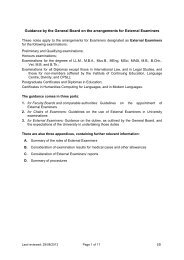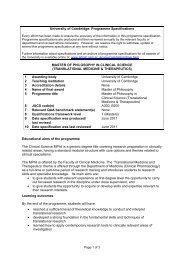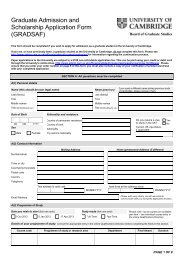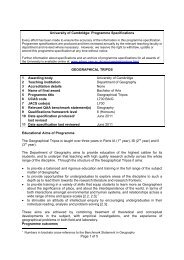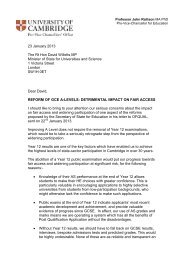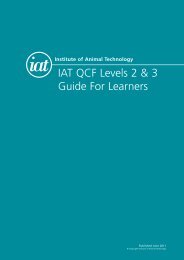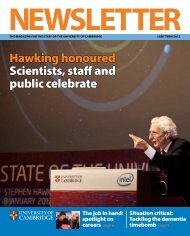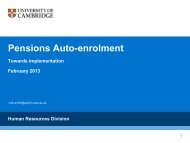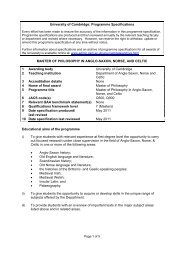Reasonable Adjustments for disabled students - the University ...
Reasonable Adjustments for disabled students - the University ...
Reasonable Adjustments for disabled students - the University ...
You also want an ePaper? Increase the reach of your titles
YUMPU automatically turns print PDFs into web optimized ePapers that Google loves.
Code of Practice: <strong>Reasonable</strong> <strong>Adjustments</strong> <strong>for</strong> <strong>disabled</strong> <strong>students</strong><br />
Unless o<strong>the</strong>rwise stated, this Code of Practice applies to all matriculated <strong>students</strong><br />
studying at <strong>the</strong> <strong>University</strong>.<br />
Background<br />
1. The Equality Act 2010 1 requires all universities not to discriminate against<br />
<strong>disabled</strong> <strong>students</strong>. Section 6 of <strong>the</strong> Act defines disability as follows: ‘A person<br />
has a disability if <strong>the</strong>y have a physical or mental impairment, and <strong>the</strong><br />
impairment has a substantial and long-term adverse effect on his or her ability<br />
to carry out normal day-to-day activities’. 2<br />
2. Section 20 of <strong>the</strong> Act 3 imposes a duty on Higher Education Institutions to<br />
make ‘reasonable adjustments’ <strong>for</strong> <strong>students</strong> in relation to:<br />
• a provision, criterion or practice (<strong>for</strong> example teaching and<br />
assessment methods)<br />
• physical features (<strong>for</strong> example access to lecture <strong>the</strong>atres, labs,<br />
teaching rooms)<br />
• auxiliary aids (whose definition includes auxiliary services) (<strong>for</strong><br />
example hearing loops, in<strong>for</strong>mation in accessible <strong>for</strong>mats or <strong>the</strong><br />
provision of Non-Medical Assistance (NMA) support)<br />
3. The substance of <strong>the</strong> duty is: where any of <strong>the</strong> <strong>University</strong>’s provisions as<br />
outlined above puts a <strong>disabled</strong> student at a substantial disadvantage in<br />
comparison with <strong>students</strong> who are not <strong>disabled</strong>, <strong>the</strong> <strong>University</strong> is required to<br />
take such steps as it is reasonable to have to take to avoid <strong>the</strong> disadvantage.<br />
A substantial disadvantage is defined by <strong>the</strong> Equality Act as one that is more<br />
than minor or trivial. The key factor, <strong>the</strong>re<strong>for</strong>e, in assessing whe<strong>the</strong>r<br />
adjustments are required is whe<strong>the</strong>r <strong>the</strong> <strong>disabled</strong> student is put at a<br />
substantial disadvantage relative to his or her non-<strong>disabled</strong> counterparts.<br />
Consequently, <strong>the</strong> purpose of <strong>the</strong> duty is not to confer an unfair advantage on<br />
<strong>disabled</strong> <strong>students</strong>, but to remove barriers to learning, where it is reasonable to<br />
do so.<br />
4. The duty is anticipatory; <strong>the</strong> <strong>University</strong> should not wait until adjustments are<br />
proposed, ra<strong>the</strong>r look to ensure, where possible, that alterations to policies,<br />
practices and procedures have been made in advance to prevent <strong>disabled</strong><br />
<strong>students</strong> suffering substantial disadvantage .There is no legal defence <strong>for</strong> <strong>the</strong><br />
1 The Equality Act 2010 replaced <strong>the</strong> Disability Discrimination Act (DDA, 1995, amended 2001, 2005).<br />
The Special Educational Needs and Disability Act (SENDA, 2001) introduced <strong>the</strong> concept of<br />
‘reasonable adjustments’ to <strong>the</strong> provision of higher education. The 2005 revision to <strong>the</strong> DDA placed a<br />
‘positive statutory duty’ on public bodies (including <strong>the</strong> <strong>University</strong>) to have due regard to <strong>the</strong> need to<br />
promote equality of opportunity between <strong>disabled</strong> and o<strong>the</strong>r persons and to avoid disability-related<br />
discrimination (among o<strong>the</strong>r obligations). All <strong>the</strong>se provisions have been incorporated into <strong>the</strong> Equality<br />
Act.<br />
2 Fur<strong>the</strong>r guidance issued by <strong>the</strong> Secretary of State on <strong>the</strong> definition of disability can be downloaded at<br />
http://www.direct.gov.uk/en/DisabledPeople/RightsAndObligations/DisabilityRights/<br />
DG_4001068<br />
3 http://www.legislation.gov.uk/ukpga/2010/15/section/20<br />
Last reviewed: 14/12/12 Page 1 of 9 ABenton
failure of an institution to make a reasonable adjustment. This would be<br />
interpreted as discrimination under Section 21 of <strong>the</strong> Act 4 .<br />
5. ‘<strong>Reasonable</strong> adjustments’ must be made to existing academic practices or<br />
programmes in order to provide <strong>students</strong> with <strong>the</strong> opportunity to effectively<br />
demonstrate <strong>the</strong>ir abilities. <strong>Adjustments</strong> might cover a wide range of aspects<br />
of <strong>University</strong> and College provision, but this Code of Practice addresses only<br />
adjustments to teaching and assessment practices.<br />
6. The QAA Code of Practice defines reasonableness as follows:<br />
‘The application of an adjustment will result from consideration of <strong>the</strong><br />
circumstances of <strong>the</strong> individual student and will involve <strong>the</strong> student in<br />
discussion of possible courses of action. What is ‘reasonable’ <strong>for</strong> an institution<br />
will vary according to a range of factors and will depend on <strong>the</strong> circumstances<br />
of <strong>the</strong> individual case. Factors influencing <strong>the</strong> determination of what is<br />
reasonable will include <strong>the</strong> effectiveness of taking particular steps in enabling<br />
<strong>the</strong> student to overcome <strong>the</strong> relevant disadvantage, health and safety issues,<br />
<strong>the</strong> effect on o<strong>the</strong>r <strong>students</strong> and <strong>the</strong> financial cost to <strong>the</strong> institution.’ 5<br />
7. The implementation of a reasonable adjustment aims to prevent <strong>the</strong> <strong>disabled</strong><br />
student from suffering substantial disadvantage as a result of <strong>the</strong>ir disability<br />
and hence to allow <strong>the</strong>m to achieve <strong>the</strong>ir maximum potential but, in defining<br />
‘reasonableness’, institutions are not required to compromise ‘competence<br />
standards’ of <strong>the</strong> courses in question. Within <strong>the</strong> Act ‘competence standards’<br />
are defined as <strong>the</strong> ‘academic, medical or o<strong>the</strong>r standard[s] applied <strong>for</strong> <strong>the</strong><br />
purpose of determining whe<strong>the</strong>r or not a person has a particular level of<br />
competence or ability’. A competence standard must not in itself be unlawfully<br />
discriminatory. It must <strong>the</strong>re<strong>for</strong>e apply equally to all <strong>students</strong>, be genuinely<br />
relevant to <strong>the</strong> course, and be a proportionate means of achieving a legitimate<br />
aim.<br />
Assessment of need and <strong>the</strong> Student Support Document (SSD)<br />
8. All <strong>disabled</strong> <strong>students</strong> who disclose a disability to <strong>the</strong> Disability Resource<br />
Centre, and who require support, are issued with a Student Support Document<br />
(SSD) which sets out adjustments recommended to support <strong>the</strong>m in <strong>the</strong>ir<br />
study at Cambridge. SSDs are produced by <strong>the</strong> DRC Disability Advisers<br />
drawing on available evidence of <strong>the</strong> impairment through a “diagnostic<br />
assessment” from a qualified professional such as a doctor or Educational<br />
Psychologist or Specialist Teacher and, in <strong>the</strong> majority of cases,<br />
supplemented by a ‘Needs Assessment’ from an independent assessor at an<br />
Access/Assessment Centre. In<strong>for</strong>mation from <strong>the</strong> diagnostic assessment is<br />
discussed with <strong>the</strong> individual student and, where appropriate, <strong>the</strong> College and<br />
4 http://www.legislation.gov.uk/ukpga/2010/15/section/21<br />
5 Chapter B4 p20<br />
http://www.qaa.ac.uk/Publications/In<strong>for</strong>mationAndGuidance/Documents/Quality%20Code%20-<br />
%20Chapter%20B4.pdf<br />
Last reviewed: 14/12/12 Page 2 of 9 ABenton
Faculty/Department, and is <strong>the</strong>n consolidated and contextualised by <strong>the</strong><br />
DRC’s Disability Advisers to produce <strong>the</strong> Student Support Document (SSD).<br />
9. SSDs are agreed jointly with <strong>the</strong> <strong>disabled</strong> student, and <strong>the</strong>n sent to <strong>the</strong> named<br />
contacts in <strong>the</strong> College and Department. It is <strong>the</strong> responsibility of <strong>the</strong><br />
Department to ensure that reasonable adjustments to departmental teaching<br />
and library provision (including any necessary physical adaptations) are<br />
considered and put in place and of <strong>the</strong> College <strong>for</strong> adjustments to teaching in<br />
supervisions, College library provision and accommodation. The College,<br />
acting though <strong>the</strong> Tutor or Director of Studies, is also responsible <strong>for</strong><br />
supporting <strong>the</strong> student by keeping a watching brief and monitoring that <strong>the</strong><br />
reasonable adjustments to both departmental and College provision have<br />
been made.<br />
<strong>Reasonable</strong> <strong>Adjustments</strong> in Teaching and Learning<br />
10. A wide range of adjustments might be recommended in <strong>the</strong> SSD depending<br />
on <strong>the</strong> student’s disability, and <strong>the</strong> particular disadvantage suffered by <strong>the</strong><br />
student, but <strong>the</strong> General Board has specifically approved <strong>the</strong> following three<br />
adjustments (which are already common practice) as ‘reasonable’ within <strong>the</strong><br />
terms of <strong>the</strong> Act and that, where specifically recommended by an individual<br />
student’s Disability Adviser and agreed by <strong>the</strong> student, Faculties and<br />
Departments are required to:<br />
• permit <strong>the</strong> student to make an audio recording of lectures <strong>for</strong> <strong>the</strong>ir<br />
own use;<br />
• provide <strong>the</strong> student with electronic copies of lecture materials in<br />
advance, <strong>for</strong> <strong>the</strong>ir own use, when available;<br />
• provide directed reading lists differentiating between ‘essential’ and<br />
‘desirable’ items.<br />
11. It is <strong>the</strong> normal expectation that ‘reasonable adjustments’ to teaching<br />
recommended by <strong>the</strong> DRC through <strong>the</strong> SSD will be put in place.<br />
Implementation of adjustments and <strong>the</strong>ir effectiveness will be monitored by <strong>the</strong><br />
College Tutor (or Director of Studies) in discussion with <strong>the</strong> student. However,<br />
if a Faculty/Department has difficulty implementing <strong>the</strong> adjustments<br />
recommended, it should discuss this fur<strong>the</strong>r with <strong>the</strong> College tutor and student<br />
as appropriate, seeking fur<strong>the</strong>r advice from <strong>the</strong> DRC. If, as a result of fur<strong>the</strong>r<br />
discussion, <strong>the</strong> Faculty/Department is of <strong>the</strong> view that <strong>the</strong> recommended<br />
adjustments are not ‘reasonable adjustments’ <strong>the</strong>n <strong>the</strong>y should request that<br />
<strong>the</strong> matter be reviewed by <strong>the</strong> Education Committee.<br />
12. If a <strong>disabled</strong> student is not satisfied that adjustments recommended have<br />
been put in place, or that <strong>the</strong> adjustments are insufficient to address <strong>the</strong>ir<br />
specific disadvantage, <strong>the</strong>y should raise <strong>the</strong> matter with <strong>the</strong>ir College tutor,<br />
who may seek review of <strong>the</strong> position by <strong>the</strong> Education Committee.<br />
Last reviewed: 14/12/12 Page 3 of 9 ABenton
<strong>Reasonable</strong> <strong>Adjustments</strong> in Assessment: alternative modes of assessment<br />
This section of <strong>the</strong> Code of Practice relates to candidates <strong>for</strong> all examinations<br />
except those assessed by <strong>the</strong>sis and oral, <strong>for</strong> whom alternative are in place 6 .<br />
13. A number of adjustments are already permitted in respect of assessment and<br />
are set out in <strong>the</strong> Board of Examinations: Special Examination Arrangements -<br />
Notes of Guidance <strong>for</strong> Staff and Students 7 . These guidelines now incorporate<br />
<strong>the</strong> arrangements <strong>for</strong> consideration of alternative modes of assessment as set<br />
out in paragraphs 14-21 and <strong>the</strong> appendix 1 to this Code<br />
14. In addition to adjustments to <strong>the</strong> length, timing and place of examination, and<br />
use of a computer, where <strong>the</strong>se do not adequately address <strong>the</strong> specific,<br />
substantial disadvantage suffered by a <strong>disabled</strong> student, <strong>the</strong> General Board<br />
has agreed that consideration should also be given to adjustment to <strong>the</strong> mode<br />
of assessment. This will, in most cases, entail <strong>the</strong> Board of Examinations<br />
setting aside <strong>the</strong> regulations <strong>for</strong> <strong>the</strong> examination where to do so is an effective<br />
and reasonable means of avoiding <strong>the</strong> disadvantage in question and where<br />
<strong>the</strong>re is no equally-effective, reasonable, alternative means of avoiding that<br />
disadvantage. To preserve <strong>the</strong> integrity of Cambridge examinations, it is<br />
essential that rigorous arrangements are in place to consult teaching staff who<br />
are experts in <strong>the</strong> subject area to be assessed; to determine whe<strong>the</strong>r an<br />
alternative mode of assessment is appropriate given <strong>the</strong> student’s particular<br />
disability; and <strong>for</strong> granting <strong>the</strong> necessary approvals <strong>for</strong> it to be put in place.<br />
The procedure agreed by <strong>the</strong> General Board is set out in appendix 2.<br />
15. Requests <strong>for</strong> consideration of an alternative mode of assessment will be <strong>for</strong><br />
exceptional cases, and will be considered on a case-by-case basis. In<br />
determining whe<strong>the</strong>r an alternative <strong>for</strong>m of assessment is appropriate, both<br />
<strong>the</strong> particular needs of a student and <strong>the</strong> particular demands of <strong>the</strong> course will<br />
be taken into account. The aim is to ensure a level playing field, (that is, that<br />
reasonable steps are taken to ensure that a <strong>disabled</strong> student is not placed at a<br />
substantial disadvantage in comparison with <strong>students</strong> who are not <strong>disabled</strong>)<br />
and not to give a <strong>disabled</strong> candidate an advantage over o<strong>the</strong>rs.<br />
16. While <strong>the</strong>re is no duty to make reasonable adjustments to genuine<br />
competence standards, <strong>the</strong> duty does apply to <strong>the</strong> assessment of that<br />
standard: <strong>the</strong> Law distinguishes between requiring <strong>students</strong> to demonstrate<br />
<strong>the</strong>y have reached a required standard, and <strong>the</strong> method by which this is<br />
assessed. There is a difference between a competence standard and <strong>the</strong><br />
process by which <strong>the</strong> standard is assessed. 8<br />
17. It is unlikely, <strong>for</strong> example, that a Faculty Board or Degree Committee could<br />
lawfully claim that <strong>the</strong> ability to pass a three-hour examination (even with<br />
additional time or <strong>the</strong> use of a computer) is a competence standard in itself <strong>for</strong><br />
6 http://www.admin.cam.ac.uk/<strong>students</strong>/studentregistry/exams/be<strong>for</strong>e/special.html<br />
7 http://www.admin.cam.ac.uk/<strong>students</strong>/studentregistry/exams/undergraduate/<br />
8 Understanding <strong>the</strong> Disability Discrimination Act: A guide <strong>for</strong> colleges, universities and adult<br />
community learning providers in Great Britain Disability Rights Commission, 2007, para 3.16<br />
Last reviewed: 14/12/12 Page 4 of 9 ABenton
all subjects. That is, it would be difficult to demonstrate that an ability to write<br />
within <strong>the</strong> specific time limit was an integral and irreplaceable component of<br />
<strong>the</strong> standards applied to determine whe<strong>the</strong>r a student has reached <strong>the</strong><br />
standard required to pass <strong>the</strong> course.<br />
18. In making a judgement on <strong>the</strong> appropriateness of an alternative mode of<br />
assessment, <strong>the</strong> Faculty Board (Degree Committee) will need to be guided by<br />
<strong>the</strong> competence standards <strong>for</strong> <strong>the</strong> award. Competence standards will vary<br />
between subjects, but <strong>the</strong> Programme Specification should in all cases<br />
provide a basis <strong>for</strong> determining <strong>the</strong>m.<br />
19. The Programme Specification sets out <strong>the</strong> course aims (which encapsulate<br />
<strong>the</strong> purpose of <strong>the</strong> course and what <strong>the</strong> Faculty/Department is trying to<br />
achieve in providing it), and <strong>the</strong> learning outcomes (which describe <strong>the</strong><br />
knowledge and skills a student might expect to gain from <strong>the</strong> course) 9 . To be<br />
lawful, <strong>the</strong> knowledge and skills deemed to be competence standards must be<br />
proportionate means of achieving <strong>the</strong> course aims. Guidance issued by <strong>the</strong><br />
Disability Rights Commission on competence standards and assessment is<br />
included in appendix 3.<br />
20. It should be borne in mind that it may not always be possible to provide an<br />
alternative mode of assessment, but where a request is declined <strong>the</strong> reasons<br />
<strong>for</strong> this decision will have to be stated with reference to <strong>the</strong> key competencies<br />
of <strong>the</strong> course. Alternative modes of assessment will be determined on a caseby-case<br />
basis, taking account of <strong>the</strong> course and <strong>the</strong> nature of <strong>the</strong> student’s<br />
disability. Agreement to a particular alternative mode of assessment <strong>for</strong> a<br />
particular student will not be taken as setting an automatic precedent <strong>for</strong><br />
o<strong>the</strong>rs.<br />
21. A method of assessment which requires candidates to demonstrate synoptic<br />
knowledge of material studies over <strong>the</strong> course or one or two years is likely to<br />
be regarded as an acceptable competence standard, but a method of<br />
assessing this knowledge which required high levels of stamina in order to<br />
complete a number of papers within a limited timescale would not be justifiable<br />
in cases where <strong>the</strong> student’s particular disability made it impossible or difficult<br />
to engage in <strong>the</strong> examination process by comparison with non-<strong>disabled</strong><br />
<strong>students</strong>. In such cases, a reasonable alternative would have to be<br />
considered.<br />
Appendix 1<br />
Procedure <strong>for</strong> consideration of requests <strong>for</strong> alternative modes of assessment<br />
1. Where a <strong>disabled</strong> student believes that both <strong>the</strong> standard modes of<br />
assessment and <strong>the</strong> standard special arrangements on offer through <strong>the</strong><br />
Board of Examinations would not alleviate <strong>the</strong> substantial disadvantage <strong>the</strong>y<br />
suffer because of <strong>the</strong>ir disability, and would not allow <strong>the</strong>m to demonstrate <strong>the</strong><br />
9 http://www.admin.cam.ac.uk/offices/education/curricula/aims.html<br />
Last reviewed: 14/12/12 Page 5 of 9 ABenton
equisite knowledge and skills required by <strong>the</strong>ir course, <strong>the</strong> Board of<br />
Examinations must consider any specific request submitted by <strong>the</strong>ir College<br />
on behalf of <strong>the</strong> student to be assessed by an alternative means. This might<br />
be, <strong>for</strong> example, to substitute submitted work in place of written papers, <strong>for</strong><br />
alterative shorter unseen papers to be set to allow <strong>the</strong>m to take <strong>the</strong>m over <strong>the</strong><br />
course a longer time period, or taking <strong>the</strong> examinations over more than one<br />
year.<br />
2. Be<strong>for</strong>e submitting a <strong>for</strong>mal request <strong>for</strong> consideration of an alternative mode of<br />
assessment, <strong>students</strong> should discuss <strong>the</strong>ir requirements with a College Tutor<br />
who should contact <strong>the</strong> Secretary of <strong>the</strong> Board of Examinations. The<br />
Secretary of <strong>the</strong> Board of Examinations will arrange a case conference<br />
involving <strong>the</strong> student, <strong>the</strong> College, appropriate academic representatives from<br />
<strong>the</strong> Faculty/Department (to include <strong>the</strong> Chair or Senior Examiner), and <strong>the</strong><br />
Disability Adviser to discuss possible options.<br />
3. Requests must be made in a timely fashion as early in <strong>the</strong> academic year as<br />
possible to ensure that appropriate teaching can be put in place, and that<br />
alternative modes can be discussed with <strong>the</strong> Faculty/Department concerned<br />
and suitable arrangements put in place. It might not be possible to<br />
accommodate requests made after <strong>the</strong> end of <strong>the</strong> Michaelmas term.<br />
4. After initial in<strong>for</strong>mal consultation has taken place, a <strong>for</strong>mal request should be<br />
made to <strong>the</strong> Secretary of <strong>the</strong> Board of Examinations, through <strong>the</strong> College, and<br />
should be accompanied by medical evidence and/or an assessment from an<br />
appropriate expert. The request should clearly state <strong>the</strong> preferred alternative<br />
method of assessment.<br />
5. The Secretary of <strong>the</strong> Board of Examinations will <strong>the</strong>n seek <strong>for</strong>mal approval<br />
from <strong>the</strong> Chair of Examiners <strong>for</strong> <strong>the</strong> alternative mode of assessment. At this<br />
stage, <strong>the</strong> Chair of Examiners might request that specific conditions, such as a<br />
deadline, or word limit are set.<br />
6. The request will <strong>the</strong>n be considered by <strong>the</strong> Education Committee, which will in<br />
turn advise <strong>the</strong> Board of Examinations. The decision of <strong>the</strong> Board of<br />
Examinations will be final.<br />
Appendix 2<br />
The following extract from <strong>the</strong> Disability Rights Commission guide to <strong>the</strong> Disability<br />
Discrimination Act might be useful to Faculties and Departments in discussing<br />
competence standards. Fur<strong>the</strong>r advice on interpretation of <strong>the</strong> Equalities Act can be<br />
obtained from Educational and Student Policy and <strong>the</strong> Legal Services Office.<br />
Extract from Understanding <strong>the</strong> Disability Discrimination Act: A guide<br />
<strong>for</strong> colleges, universities and adult community learning providers in Great<br />
Britain Disability Rights Commission, 2007<br />
Last reviewed: 14/12/12 Page 6 of 9 ABenton
3.16 Competence standards<br />
A competence standard is defined by Section 28S of <strong>the</strong> DDA Part 4 as ‘an<br />
academic, medical or o<strong>the</strong>r standard applied by or on behalf of an [education<br />
provider] <strong>for</strong> <strong>the</strong> purpose of determining whe<strong>the</strong>r or not a person has a particular<br />
level of competency or ability.’<br />
Competence standards apply to all aspects of courses: in admissions (entry criteria),<br />
on-course assessments (exams) and awarding qualifications. Education providers<br />
may be working with <strong>the</strong> competence standards that have been set by external<br />
bodies (such as general qualifications bodies governing A levels or Highers),<br />
qualifications bodies (such as <strong>the</strong> GMC or <strong>the</strong> Law Society) or <strong>the</strong>y may determine<br />
<strong>the</strong>ir own competence standards <strong>for</strong> particular courses and qualifications (eg art<br />
history or graphic design). All providers will be responsible <strong>for</strong> implementing <strong>the</strong><br />
competence standards (whe<strong>the</strong>r external or internal) in a non-discriminatory way.<br />
Where providers are responsible <strong>for</strong> determining <strong>the</strong>ir own standards, <strong>the</strong>y are<br />
responsible <strong>for</strong> ensuring that <strong>the</strong>ir standards are not discriminatory.<br />
It is important that providers review <strong>the</strong> competence standards <strong>for</strong> all courses and<br />
exams to ensure that <strong>the</strong>y are non-discriminatory. By doing this, providers will be<br />
unlikely to be acting in a way that constitutes unlawful discrimination under <strong>the</strong>se<br />
duties. If such standards have a discriminatory impact against <strong>disabled</strong> people or<br />
certain groups of <strong>disabled</strong> people, <strong>the</strong>n to remain lawful <strong>the</strong>y must be objectively<br />
justifiable.<br />
In this context discriminatory competence standards are only objectively justifiable if<br />
<strong>the</strong>y are a proportionate means of achieving a legitimate aim. This means that <strong>the</strong><br />
purpose of <strong>the</strong> standard should be identified and assessed as to whe<strong>the</strong>r it is<br />
genuine and fair in relation to its impact on <strong>disabled</strong> <strong>students</strong>. Genuine competence<br />
standards must be set at a level that is proportionate to <strong>the</strong> valid purpose or aim of<br />
<strong>the</strong> particular standard. A balance has to be struck between achieving <strong>the</strong> legitimate<br />
aim of <strong>the</strong> competence standard and ensuring this is done in a way that does not<br />
discriminate against <strong>disabled</strong> <strong>students</strong>.<br />
To achieve <strong>the</strong> right balance, <strong>the</strong> level at which <strong>the</strong> standard is set must not be one<br />
that has a detrimental impact upon <strong>disabled</strong> <strong>students</strong> which is disproportionate to <strong>the</strong><br />
purpose of <strong>the</strong> standard. Such standards would be unlawful because <strong>the</strong>y are<br />
objectively unjustifiable.<br />
In order to have lawful competence standards, consideration must be given as to<br />
whe<strong>the</strong>r competence standards are set at an appropriate level in relation to <strong>the</strong><br />
legitimate aim of <strong>the</strong> standard. To do this involves advance consideration of <strong>the</strong><br />
range of actual and possible competence standards, <strong>the</strong> purpose of each standard,<br />
and <strong>the</strong> impact each standard has, or would have, upon <strong>disabled</strong> <strong>students</strong>. Providers<br />
should give particular thought to whe<strong>the</strong>r an overly demanding standard is being set<br />
in relation to its purpose, and in relation to <strong>the</strong> type or level of exam or qualification<br />
being awarded.<br />
Last reviewed: 14/12/12 Page 7 of 9 ABenton
Although <strong>the</strong>re is no duty to make reasonable adjustments to competence standards,<br />
<strong>the</strong> duty does apply in most cases to <strong>the</strong> assessment of that standard. It is, <strong>the</strong>re<strong>for</strong>e,<br />
extremely important to identify at <strong>the</strong> outset whe<strong>the</strong>r a criterion or requirement is a<br />
competence standard. If something is considered to be a competence standard, a<br />
provider should <strong>the</strong>n consider <strong>the</strong> specific purpose of <strong>the</strong> competence standard and<br />
ascertain whe<strong>the</strong>r this purpose is legitimate. What must also be properly examined is<br />
<strong>the</strong> adverse impact applying <strong>the</strong> standard has, or could have, on <strong>disabled</strong> <strong>students</strong>.<br />
By thoroughly considering all alternative less discriminatory or non-discriminatory<br />
standards, providers should be able to determine whe<strong>the</strong>r or not a standard is<br />
justifiable and, consequently, lawful.<br />
Competence standards and assessment<br />
The purpose of an exam or assessment is to determine a student’s competence,<br />
skills or knowledge in a particular area, and exams and assessments must be<br />
rigorous regarding standards to ensure that all <strong>students</strong> are compared against <strong>the</strong><br />
same benchmark.<br />
While <strong>the</strong>re is no duty to make reasonable adjustments to genuine competence<br />
standards, <strong>the</strong> duty does apply to <strong>the</strong> assessment of that standard. There is,<br />
<strong>the</strong>re<strong>for</strong>e, a difference between a competence standard and <strong>the</strong> process by which<br />
<strong>the</strong> standard is assessed.<br />
Having <strong>the</strong> requisite level of knowledge to pass an exam is a competence standard.<br />
However, <strong>the</strong> examination itself (as opposed to how well <strong>the</strong> student does in <strong>the</strong><br />
exam) may not be a competence standard because <strong>the</strong> physical process of taking<br />
<strong>the</strong> exam does not necessarily determine a person’s competence or ability in that<br />
particular subject area, except in certain circumstances.<br />
As all <strong>students</strong> must be able to demonstrate <strong>the</strong>ir competence in <strong>the</strong> most<br />
appropriate way <strong>for</strong> <strong>the</strong>m, providers should be extremely clear about exactly what is<br />
being assessed. <strong>Reasonable</strong> adjustments can <strong>the</strong>n be applied to <strong>the</strong> assessment<br />
process without compromising <strong>the</strong> competence standards <strong>the</strong>mselves. <strong>Reasonable</strong><br />
adjustments to assessment processes might include: extra time, separate rooms to<br />
avoid disruption, alternative assessments such as vivas or dissertations ra<strong>the</strong>r than<br />
unseen exams, use of specialist equipment or support in exams.<br />
There are occasions when <strong>the</strong> process of assessing a competence standard is linked<br />
to <strong>the</strong> standard. For example, being able to undertake a practical exam in medicine<br />
to demonstrate competence in dissection, or to undertake an oral exam to be an<br />
interpreter in a <strong>for</strong>eign language, will be a competence standard. In this case, <strong>the</strong><br />
ability to take <strong>the</strong> practical or oral exam is part of <strong>the</strong> standard.<br />
Last reviewed: 14/12/12 Page 8 of 9 ABenton
The following are examples which are unlikely to amount to competence standards in<br />
most cases:<br />
• being able to cope with <strong>the</strong> demands of a course<br />
• having good health and/or fitness (if this is unnecessary <strong>for</strong> <strong>the</strong> course. For<br />
example, it may be necessary <strong>for</strong> a sports science course)<br />
• attendance requirements<br />
• speaking or writing clearly 10 .<br />
Where providers are implementing standards set by external bodies (such as general<br />
qualifications bodies or qualifications bodies), it is advisable that <strong>the</strong>y have working<br />
relationships with those organisations to ensure that <strong>the</strong>y can discuss any issues<br />
over <strong>the</strong> application of <strong>the</strong> standards in respect of individual <strong>disabled</strong> applicants or<br />
candidates, subject to <strong>the</strong> <strong>disabled</strong> person’s consent.<br />
10 Footnote added <strong>for</strong> clarity after consultation with Faculty Boards and Degree Committee, Easter<br />
term 2012 - The <strong>University</strong> of Cambridge interprets this to mean write legibly or speak distinctly or<br />
audibly. Students will be expected to be able to express <strong>the</strong>ir ideas and demonstrate <strong>the</strong>ir<br />
understanding clearly, if necessary supported by <strong>the</strong> use of a computer, amanuensis or o<strong>the</strong>r aid.<br />
Last reviewed: 14/12/12 Page 9 of 9 ABenton


